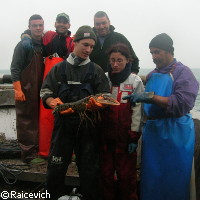Scientists aboard a new fishing management project
An EU-funded project that brings together fishermen and scientists to discuss the problems faced by the fishing industry has completed an evaluation of how scientists and fishermen see their collaboration. The GAP1 ('Bridging the gap between science and stakeholders: phase 1 - common ground') project, funded with EUR 6 million under the 'Science in society' Thematic area of the Seventh Framework Programme (FP7), is the first phase of a programme to develop action plans for marine spatial planning, assess sustainability of resources and fisheries, make ecological marine studies, develop management measures and make decisions on fisheries management. The active participation of fishermen provides scientists with invaluable access to practical aspects of everyday management of European fisheries. Together, fishermen and scientists from all over the EU are taking on some of the biggest problems facing the ocean and fishing industries today. Sharing experience and knowledge, they will carry out research case studies that will lead to finding the most workable solutions to problems such as overfishing, pollution, damage to the ocean caused by trawling, and sustainable management of resources. As well as developing research partnerships, GAP1 partners have also evaluated the collaboration process itself. This has offered important insights into the best ways to establish fruitful partnerships. As part of the evaluation, researchers conducted approximately 20 interviews with fishermen and scientists. They were asked questions such as: 'How has your experience working together with scientists/fishermen been?', 'What advice would you give to improve the cooperation?' and 'What are your concerns about this type of cooperation?' 'What I would suggest to any scientist who wants to enlist the help of fishermen is that they first go on the boats and observe the operation, and then they would straightaway be able to see what we could [do] to practically assist them,' responded one fisherman. 'We are not going to stop people coming in, as long as they don't get in the way of what we are doing!' Another said, 'Scientists or biologists need to come to see first-hand what we are talking about. I'm not going to sit for hours and tell people what happens; scientists can find that out for themselves in one day at sea in a normal fishing boat. Then they can see how we work and that would help other scientists because they can share what they have seen.' The GAP1 consortium, comprising 16 scientific institutions and 15 industry and other stakeholders from 11 countries, hopes to create effective new management schemes that will have a big and positive impact on European fisheries. Earlier this year, the project published a 'Good Practice Guide' on how scientists and fishermen or other stakeholders can work together most effectively. One of the main motivations behind GAP1 is to engage the public so that it is easier for everyone to make collective choices on the scientific issues most important to the sustainable management of the marine environment.



